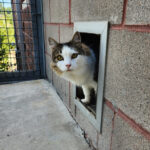While kennel cough is a term commonly associated with dogs, you might be surprised to learn that cats can also be affected by this respiratory illness. If you’re a cat owner, especially one who frequently interacts with other animals or boards your feline friend, understanding the nuances of “kennel cough” in cats, or feline infectious tracheobronchitis, is crucial. This guide will delve into what kennel cough means for cats, exploring its causes, symptoms, treatment, and preventative measures, ensuring you’re well-equipped to protect your beloved pet.
What Exactly is Kennel Cough in Cats?
Kennel cough, more formally known as infectious tracheobronchitis, is an infection affecting the upper respiratory tract, specifically the trachea (windpipe) and bronchi (large air passages in the lungs). In the canine world, kennel cough is a highly contagious condition with multiple viral and bacterial culprits. However, in cats, the picture is a bit simpler.
The primary culprit behind kennel cough in cats is the bacteria Bordetella bronchiseptica. While other pathogens can cause respiratory issues in felines, Bordetella is the agent most closely linked to the classic “kennel cough” presentation. Therefore, when we talk about kennel cough in cats, we are often referring to a Bordetella bronchiseptica infection.
How Do Cats Contract Kennel Cough?
Just like in dogs, Bordetella bronchiseptica spreads easily through direct contact. This means your cat can catch kennel cough through:
- Airborne droplets: Coughing and sneezing from infected animals release bacteria into the air, which can be inhaled by nearby cats.
- Direct contact: Close encounters with infected cats or dogs, such as grooming or nose-to-nose greetings, can transmit the bacteria.
- Contaminated objects (Fomites): Sharing items like food and water bowls, toys, bedding, or even grooming tools with an infected animal can facilitate the spread of Bordetella.
Cats in certain environments face a higher risk of exposure. These high-risk situations include:
- Shelters and Rescues: Overcrowded conditions in animal shelters or rescue facilities increase the chances of encountering infected animals.
- Pet Stores: Similar to shelters, pet stores can house numerous animals in close proximity, potentially exposing cats to Bordetella.
- Boarding Facilities and Catteries: Any environment where multiple cats are housed together, such as boarding kennels or breeding catteries, can be a breeding ground for respiratory infections.
- Multi-Pet Households: If a dog or another cat in your home contracts kennel cough, your cat is at increased risk.
- Outdoor Cats: Cats that roam outdoors have more opportunities to interact with other animals, including potentially infected ones.
- Travel and Shows: Traveling with your cat or participating in cat shows can expose them to new environments and potentially sick animals.
Furthermore, a cat’s overall health and environment play a role in their susceptibility. Factors that can weaken a cat’s immune system and increase their risk of infection include:
- Stress: Stress from moving, changes in routine, or overcrowding can compromise the immune system.
- Poor Ventilation: Stuffy or poorly ventilated environments can concentrate airborne pathogens.
- Exposure to Irritants: Smoke, dust, and other airborne irritants can damage the respiratory tract, making cats more vulnerable to infection.
- Underlying Health Conditions: Kittens, senior cats, and cats with pre-existing health problems or weakened immune systems are more susceptible to severe infections.
Can Kennel Cough Spread Across Species? Cats, Dogs, and Humans
A common concern for pet owners is the potential for cross-species transmission. Here’s what you need to know about the spread of Bordetella bronchiseptica:
- Cat to Cat and Cat to Dog: Yes, Bordetella bronchiseptica is contagious between cats and dogs. Cats can catch it from infected dogs and vice versa.
- Humans and Kennel Cough: While possible, it’s very uncommon for humans to contract Bordetella bronchiseptica from cats or dogs. Even if transmission occurs, healthy adults with strong immune systems are unlikely to develop more than mild symptoms, if any. However, individuals with compromised immune systems should exercise caution and consult their doctor if concerned.
- Human as a Carrier: Humans can inadvertently act as carriers of the bacteria. Bordetella can survive for a short time on hands, clothing, and surfaces. Therefore, it’s important to practice good hygiene, such as handwashing after interacting with pets, especially if one is showing signs of illness.
To minimize the risk of spreading infections, especially in multi-pet households, good hygiene practices are always recommended.
Recognizing Kennel Cough Symptoms in Cats
Identifying kennel cough in cats involves watching for specific respiratory symptoms. The most common signs include:
- Coughing: This is the hallmark symptom. The cough may be dry or moist and can range from mild to more forceful.
- Sneezing: Frequent sneezing is another common sign of upper respiratory irritation.
- Runny Nose: Nasal discharge can be clear, white, yellow, or green, depending on the severity and stage of the infection.
- Eye Discharge: Watery or mucus-like discharge from the eyes, sometimes accompanied by conjunctivitis (inflammation of the conjunctiva), can occur.
- Lethargy: Your cat may seem more tired than usual and less interested in playing or interacting.
- Fever: A slightly elevated temperature can indicate infection, although it’s not always present or easily noticeable at home.
- Loss of Appetite: A decreased appetite or refusal to eat can be a sign of general illness.
- Difficulty Breathing: In severe cases, particularly in vulnerable cats, kennel cough can progress to pneumonia, leading to labored breathing, rapid breathing, or open-mouth breathing. Difficulty breathing is a medical emergency requiring immediate veterinary attention.
It’s important to remember that these symptoms can also be associated with other feline respiratory illnesses. Therefore, self-diagnosis is not recommended.
When to Seek Veterinary Care for a Coughing Cat
Any cough in a cat warrants a visit to the veterinarian. While kennel cough is often mild in cats, it’s essential to rule out other, potentially more serious causes of coughing and ensure your cat receives appropriate care.
Immediate veterinary attention is crucial if your cat exhibits:
- Difficulty breathing or labored breathing
- Severe lethargy or weakness
- Complete loss of appetite
- High fever
- Symptoms that worsen rapidly
Even for milder symptoms, prompt veterinary consultation is advised. Many conditions can cause coughing in cats, including:
- Feline Asthma: A chronic inflammatory condition of the airways.
- Heart Disease: Certain heart conditions can cause fluid buildup in the lungs, leading to coughing.
- Other Respiratory Infections: Viral infections (like feline herpesvirus and calicivirus), fungal infections, and bacterial infections other than Bordetella can cause coughing.
- Parasites: Lungworms and heartworms can cause respiratory symptoms, including coughing.
- Allergies: Environmental or food allergies can trigger coughing.
- Foreign Bodies: Inhaled objects can irritate the airways and cause coughing.
- Cancer: In rare cases, tumors in the lungs or airways can lead to coughing.
Furthermore, cat owners sometimes mistake hairballs for coughing. While both involve respiratory sounds, hairballs are typically preceded by gagging or retching and result in the expulsion of a hairball. Coughing due to respiratory infections is a different mechanism and sound. While occasional hairballs (1-2 per month) are often normal, frequent hairballs or coughing should be evaluated by a vet.
Diagnosing Kennel Cough in Felines
Your veterinarian will perform a thorough physical examination of your cat, paying close attention to their respiratory system. This examination, combined with your description of symptoms and history, may be sufficient to initiate treatment for a respiratory infection.
However, in cases of:
- Recurrent respiratory infections
- Lack of response to initial treatment
- Severe symptoms
- Suspected underlying conditions (like asthma)
Your vet may recommend further diagnostic testing, which could include:
- Bloodwork: To assess overall health and rule out systemic illness.
- Radiographs (X-rays): To visualize the lungs and chest cavity, helping to identify pneumonia, heart conditions, or other abnormalities.
- Swabs for Culture and Sensitivity: Samples from the throat or nasal discharge can be taken to identify the specific infectious agent (like Bordetella) and determine the most effective antibiotics.
- Other tests: Depending on the suspected cause, other tests like bronchoscopy (examination of the airways with a camera) or allergy testing might be recommended.
Treatment Strategies for Feline Kennel Cough
Fortunately, most cats with kennel cough respond well to treatment. The typical approach involves:
- Antibiotics: These are the cornerstone of treatment for Bordetella infections. Your veterinarian will choose an appropriate antibiotic based on the suspected bacteria and, ideally, culture and sensitivity results.
- Cough Suppressants: In some cases, cough suppressants may be prescribed to provide relief from coughing and allow the cat to rest. However, these are used cautiously in cats and not always necessary.
- Immune System Support: Supplements to boost the immune system, such as L-lysine or interferon, may be recommended to aid in recovery.
- Hospitalization: Cats with severe symptoms, pneumonia, or dehydration may require hospitalization for more intensive care, including intravenous fluids, oxygen therapy, and nebulization treatments.
Never administer any medications to your cat without explicit veterinary guidance. Many human medications and even some pet medications are toxic to cats.
Home Care to Support Recovery
You can play a vital role in your cat’s recovery by providing supportive care at home:
- Rest and Isolation: Provide a quiet, comfortable space for your cat to rest, away from other pets and children. Isolating a sick cat helps prevent the spread of infection to other animals in the household.
- Fresh Water and Tempting Food: Ensure easy access to fresh, clean water. If your cat’s appetite is reduced, offer palatable, easily digestible food, such as soft food or bland cooked chicken or fish. Warming food slightly can enhance its aroma and encourage eating.
- Humidification: Using a humidifier (cool mist or steam) with plain water or saline solution can help soothe irritated airways and loosen mucus. Avoid adding medications or essential oils to the humidifier unless specifically directed by your veterinarian, as some can be harmful to cats.
- Monitor Symptoms: Closely observe your cat’s symptoms and report any worsening or new concerns to your veterinarian promptly.
Prevention of Kennel Cough in Cats
While kennel cough in cats is generally less common and less severe than in dogs, preventative measures can further reduce your cat’s risk:
- Vaccination: A Bordetella bronchiseptica vaccine is available for cats, but it is not routinely recommended for all cats due to the relatively low risk of severe disease. However, your veterinarian may recommend it for cats in high-risk situations, such as those frequently exposed to shelters, boarding facilities, or multi-cat environments, especially kittens.
- Vaccination Against Core Feline Respiratory Diseases: Vaccinating your cat against feline viral rhinotracheitis (feline herpesvirus) and feline calicivirus, which are more common causes of feline upper respiratory infections, is a crucial part of routine preventative care. These vaccines don’t protect against Bordetella, but they strengthen overall respiratory health.
- Maintain Good Health: Providing a balanced diet, minimizing stress, ensuring good ventilation, and avoiding exposure to irritants like smoke all contribute to a strong immune system and reduced susceptibility to infections.
- Limit Exposure: Keeping your cat indoors reduces their exposure to other animals and infectious agents. If your cat goes outdoors, supervise their interactions with other animals.
- Hygiene Practices: If you interact with other animals, especially in high-risk environments, practice good hygiene, such as handwashing, before interacting with your cat. Clean and disinfect shared items like food and water bowls regularly.
Knowledge is Key to Cat Health
While the term “kennel cough” might initially sound alarming when it comes to cats, understanding that feline infectious tracheobronchitis caused by Bordetella bronchiseptica is generally a mild and treatable condition is reassuring. Being aware of the risk factors, recognizing the symptoms, and knowing when to seek veterinary care empowers you to be a proactive advocate for your cat’s health. By taking preventative measures and promptly addressing any signs of respiratory illness, you can help your feline companion stay healthy, happy, and purring contentedly.


